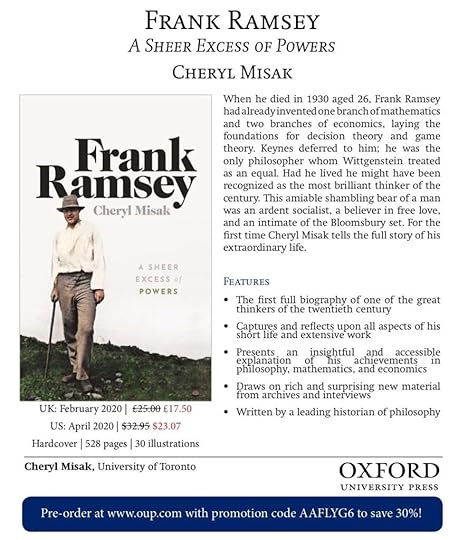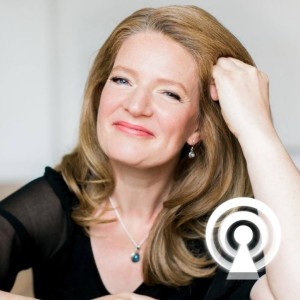Peter Smith's Blog, page 65
October 3, 2019
Forthcoming book on Frank Ramsey
Cheryl Misak has a new book on Frank Ramsey forthcoming from OUP, which should be very good. It is available for pre-order at an excellent price too:

The post Forthcoming book on Frank Ramsey appeared first on Logic Matters.
September 30, 2019
The small matter of a cover picture … and one that got away

Paul Klee, Castle and Sun 1928
The Cambridge Introductions to Philosophy series has a standard cover layout — for example, here’s the cover of my Gödel book in the series, with a rather anonymous bit of abstract artwork (not chosen by me). Some other books use more interesting illustrations — for example, here’s the cover Martin Peterson’s book on Decision Theory (this is part of The Cheat with the Ace of Clubs (c. 1630) by Georges de la Tour).
Well, I’d wanted to use the Paul Klee’s Castle and Sun for the second edition of IFL which will appear in the same series. But sadly, CUP’s arrangement with Getty Images has changed, and that’s no longer an option. So I wondered about a Cézanne still life from Chicago. I had a print of another of his still lifes with apples on my wall as a logic student all those years ago, and rather liked the idea of — as it were — going full circle with another one. But my editor thinks it isn’t sufficiently “logical/technological”, and I can see the point.
But that leaves me at a bit of a loss where to go next. So suggestions of suitable cover art for an introductory logic text will be most welcome! It needs to be reasonably vibrant in colour to fit into the overall series design, of the same general shape as the two illustrated examples. and, ideally, freely available under a creative commons licence or similar. Any thoughts?
[By the way, I’ve only just discovered the website of the Chicago Art Institute: well worth a visit!]
The post The small matter of a cover picture … and one that got away appeared first on Logic Matters.
September 26, 2019
Soundness, completeness, aesthetics
There’s one big change in the latest version of IFL2. I’ve taken up a good suggestion (in so doing, once more appreciating the kindness of strangers), and I have re-arranged the material on soundness and completeness.
The chapters on PL and QL metatheory in the main text now just explain what those metatheorems say and why they matter. Outline proofs are now in an Appendix. This way, the main text isn’t interrupted by sections signalled as skippable in a first course; while the proofs get a more expansive treatment than they did before so those readers who are interested have a better chance of following the arguments. This seems to me to work much better.
The Appendix is almost stand-alone. To understand it, you need to know that the Fitch-style system I’m talking about has dummy names (parameters) but no free variables, and terms are just proper names or dummy names. A q-valuation is, as you would expect, an assignment of domain, references to names, extensions to predicates. An expanded q-valuation for a language adds assignments of references to one or more dummy names as needed. And set/collection talk can be taken as talk of virtual classes, interchangeable with plural talk, with choice of idiom dependent on local convenience. With that by way of preamble here is the new Appendix. I hope it is clear the sort of level of understanding I am aiming to convey. I’ll no doubt revise this again for minor glitches. But at this stage all comments still most welcome of course.
In the latest issue of the London Review of Books, the novelist Sarah Perry reviews a book about depictions of malaria in nineteenth-century and postcolonial fiction. Which was actually sounding surprisingly interesting — for Sarah Perry herself just can’t write badly! — until she tells us that this book “does not offer any particular aesthetic pleasures. Elegance and clarity of style is neither attempted nor achieved. This is an academic monograph …”
Oh dear. What is the point of writing such a book — after all, one dealing with literary themes and the human world they engage with — without trying to trying to give the reader at least some literary pleasure in well-turned phrases and elegant juxtapositions?
And introductory logic books too ought to aim for readability and lightness of touch, and offer some modest aesthetic pleasures. We can all think of well-known and often-used books which are worthy but, by this measure, fail spectacularly (no names, no pack drill). This is a rather daunting thought when you are about to launch your own effort into the world. I like to think that the new Appendix has it cute moments. But fond authors aren’t the best judges!
The post Soundness, completeness, aesthetics appeared first on Logic Matters.
September 17, 2019
J. Donald Monk, Mathematical Logic and Lectures on Set Theory
I have only just noticed that J. Donald Monk has made his admirable Mathematical Logic (Springer, 1976) freely available for download, which could well be of interest to some readers here.
A smaller number of discerning readers might also be interested his book-length Lectures on Set Theory (work in progress, it seems, last updated a few months ago). Unlike that earlier more discursive book, these are rather terser notes. But they consequently cover a great deal, including — on a quick look — a significant amount of relatively recent material. The main parts of the Lectures are
Logic
Elementary Set Theory
Generic sets and forcing, I
Infinite combinatorics
Generic sets and forcing, II
PCF
Continuum cardinals
This seems as if it could be a useful resource.
The post J. Donald Monk, Mathematical Logic and Lectures on Set Theory appeared first on Logic Matters.
September 15, 2019
Modernizing
There have been two big distractions from blogging over the last month. Well, there have been three if you count the political chaos here in the UK, and the unnerving sense that things really are falling apart in a dangerously nasty way. But I have nothing to add on that, except perhaps a recommendation of Chris Grey’s long-running Brexit blog, in the unlikely event that you are interested in finding informed writing on the ongoing shitshow here yet haven’t come across this truly admirable weekly commentary.
But back to local distractions. One is having major building work done, a loft extension, and some other modernizing of the house. And I have no horror stories to report. All is going very well, it seems; our builders have been/are continuing to be terrific, and everything looks as if it is going to turn out even better than we hoped. But still, despite that … Three months of fairly continuous disturbance, albeit mostly at quite a low level, have been strangely unsettling — considerably more so than is rational, no doubt for deep reasons of having your space invaded. Weekends have been cherished oases of peace. However, after two solid weeks, the plasterers finished on Friday. So from here on, there won’t be the same levels of dirt and dust to contend with. There’s still a lot of upheaval in the house but I’ve ceremoniously taken down the dustsheets from all over the books in my miniature study, and a more cheering semi-normality returns … Only another two months, on and off, to go …
The other distraction has been the dratted IFL2. Yes, I did get a full version in to CUP by the beginning of August. But — long story — the Press have decided that they don’t like the layout I thought we’d agreed, so I’ve been recasting the logic book into the same format as my Gödel book which they also published, Computer Modernizing the text. But of course, it isn’t as simple as changing the LaTeX font command in the preamble. Oh no! For a start, lots of proofs that can’t be split over pages now need to be relocated, nudged up and down by rewriting surrounding text. And other text needs to be rewritten to stop chapters now ending a few lines onto a new page. And so on. And so forth. You really don’t want to know the ins and outs. Partly I’ve been grinding my teeth in frustration. But partly I’ve been forced to do some close re-re-reading, and this has led to some significant improvements in clarity and even a late rearrangement of some material. So it’s not at all been wasted time. But I’ll be pleased when this is all done. And oh my days, how boring is indexing?
So Brexit, building and book has for a while meant no blogging energy. But I’m now going to try to pick up the threads … Onwards!
The post Modernizing appeared first on Logic Matters.
August 13, 2019
Rachel Podger in conversation
 I didn’t mention here a recent concert at Wigmore Hall with Rachel Podger and her small band of friends, Brecon Baroque, playing Vivaldi with such enormous verve and love for the music. A wonderful experience, which left the audience cheering for more!
I didn’t mention here a recent concert at Wigmore Hall with Rachel Podger and her small band of friends, Brecon Baroque, playing Vivaldi with such enormous verve and love for the music. A wonderful experience, which left the audience cheering for more!
So I’ve just listened with particular enjoyment to this Wigmore Hall podcast where Rachel Podger talks delightfully about playing baroque violin, about her band Brecon Baroque, and about Bach and Vivaldi. Worth the listen!
The post Rachel Podger in conversation appeared first on Logic Matters.
A LaTeX indexing trick
Oh, the joys of indexing … Though using the LaTeX indexing tools reduces the pain a bit. Encountered one problem, however:
Suppose you mention Aristotle (as you do) at the top of p. 40. And then you discuss a quite different point from Aristotle e.g. from the bottom of p. 41 over to page 43. Then you surely want the index entry to read
Aristotle, 40, 41–43
So you put \index{Aristotle} in your text around the top p. 40, and then mark the start of the page range with \index{Aristotle|(} near the bottom of p. 41 and finish the range with \index{Aristotle|)}. Only to find to your annoyance that Makeindex produces
Aristotle, 40–43
Drat! What to do?
As I discovered from tex.stackexchange, the thing to do is to use the imakeidx package, and so your preamble has
\usepackage{imakeidx}
\makeindex[options=-r]
The option suppresses adjacent page numbers for an index heading being crunched into a page range, so that page ranges are given only in response to explicit codings for ranges using \index{headword|(} and \index{headword|)}.
Maybe everyone except me knew that! — but I will add a note for posterity to LaTeX for Logicians.
The post A LaTeX indexing trick appeared first on Logic Matters.
August 10, 2019
Postcard from Suffolk
Off to Suffolk for a few days, to stay near Aldeburgh while building works make our house uninhabitable. Little more than ninety minutes away from Cambridge, but another world. Stern instructions to self: no logic book for a week, no fretting about Brexit news for a week, no worrying about the building work either as no new decisions have to be made for a while. Instead, long coastal walks (by good fortune, it’s been breezy and dry — good walking weather), Suffolk churches to visit, relaxed meals out …
Oh, and the serendipity of a good Oxfam bookshop! Found in Woodbridge, no less than three novels on my ‘wanted’ list. Ridiculous how pleasing I find that.
The post Postcard from Suffolk appeared first on Logic Matters.
August 2, 2019
A triple turnstile!
You want a nice triple turnstile which matches in size and weight the usual Computer Modern \vdash and \vDash turnstiles?  Look no further. Here’s the trick, also linked for future reference on the LaTeX for Logicians symbols page.
Look no further. Here’s the trick, also linked for future reference on the LaTeX for Logicians symbols page.
The post A triple turnstile! appeared first on Logic Matters.
Elementary reading about why we might doubt Excluded Middle?
If, by some chance, you were writing a couple of pages of recommendations for “Further reading” for an elementary logic book, and wanted an entry on constructivist doubts about the Law of Excluded Middle, what would you choose?
Ideally something short, accessible (in the sense of being easy to understand for a near beginner), accessible (in the sense of being available online or in most university libraries). Bell/DeVidi/Solomon, Logical Options, pp. 193–195 is, well, an option. But any alternatives come to mind?
The post Elementary reading about why we might doubt Excluded Middle? appeared first on Logic Matters.




